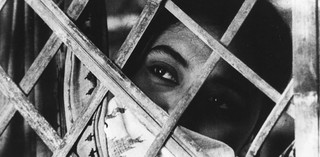Ritwik Ghatak & Kumar Shahani Stepping Into the Same River

Production still from Meghe Dhaka Tara (The Cloud-Capped Star) 1960 / Director: Ritwik Ghatak / Image courtesy: Ritwik Ghatak Memorial Trust / View full image
When
5 Dec 2010 – 23 Feb 2011
Where
Gallery of Modern Art, Cinema A
About
Contemporary Indian filmmaker Kumar Shahani is celebrated in a program that places him next to his late teacher and mentor, Ritwik Ghatak, and features four restored prints of films by Shahani from the Queensland Art Gallery collection – The Khayal Saga 1988, Kasba 1990, Immanence 1991 and The Bamboo Flute 2000.
Ritwik Ghatak, born in 1925 in East Bengal (now Bangladesh), is one of the most striking and poetic voices in twentieth century cinema. He is also one of the least recognised of that select number of truly unique filmmakers who shape every aspect of their oeuvre, as his films have been historically very difficult to see. Working across theatre, fiction and film, he takes folk, classical and epic forms and creates metaphoric works of great power. As a playwright he worked with the Indian People's Theatre Association (IPTA) the theatre arm of the Communist Party of India. From his first film Nagarik (The Citizen) in 1953 until his early death in 1976 in Calcutta, accelerated by poverty and alcohol, he made eight feature films.
Kumar Shahani (b. 1940, Larkana, Sind (now Pakistan) studied with Ghatak at the Film and Television Institute of India in Pune. Ghatak considered him one of his most talented students. Shahani's first feature film Maya Darpan 1972, was recognised as India's first formalist film; he has made six feature films since that time with Khayal Gatha 1988 winning the FIPRESCI (International Federation of Film Critics) Prize at the Rotterdam International Film Festival in 1990 as well as the Prince Claus Award (1998) and multiple Indian Filmfare Awards (1972, 1990, 1991). Apart from Shahani, Ghatak taught many other filmmakers who have since been celebrated for their unique visual and narrative styles, including Adoor Gopalkrishnan, Mrinal Sen and Mani Kaul. The hopes, debates and disappointments of postcolonial India are reflected in the work of these directors who combine radical aesthetics and critical politics. Many of their films explore social transformation, whether deriving from the experience of displacement at the time of the partition of India, its offspring in the form of communalism, the alienation caused by rapid industrialization, or the fractures of modernization and economic polarisation.
QAGOMA acknowledges all the archives, filmmakers and distributors who have generously provided screening materials for this program. Program curated by José Da Silva, Australian Cinémathèque.
List of Works
- Kasba 1990 | Director: Kumar Shahani
- Titas Ekti Nadir Naam (A River Called Titas) 1973 | Director: Ritwik Ghatak
- Jukti Takko Ar Gapoo (Reason, Argument and Story) 1974 | Director: Ritwik Ghatak
- Meghe Dhaka Tara (The Cloud-Capped Star) 1960 | Director: Ritwik Ghatak
- Komal Gandhar (A Soft Note on a Sharp Scale) 1961 | Director: Ritwik Ghatak
- Bhavantarana (Immanence) 1991 | Director: Kumar Shahani Subarnarekha (The Golden Thread) 1965 | Director: Ritwik Ghatak
- Char Adhyay (Four Chapters) 1997 | Director: Kumar Shahani
- Khayal Gatha (The Khayal Saga) 1988 | Director: Kumar Shahani
- Ajantrik (The Unmechanical aka The Mechanical Man aka The Pathetic Fallacy) 1958 | Director: Ritwik Ghatak
- Bari Btheke Paliye (The Runaway) 1959 | Director: Ritwik Ghatak
- Birah Bharyo Ghar Aangan Kone (The Bamboo Flute) 2000 | Director: Kumar Shahani
- Nagarik (The Citizen) 1952 | Director: Ritwik Ghatak

